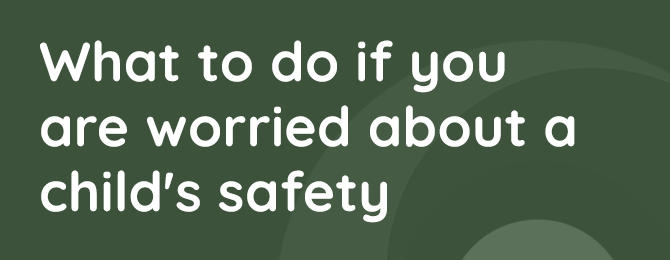What to do if you are worried about a child's safety

Call 999 if the child is in real danger now.
If you're concerned about a child or young person and suspect abuse, even if you're unsure, contact 01752 668000 or email mash@plymouth.gov.uk.
You can also contact the NSPCC if you want to talk to someone about your concerns and get advice.
What to report
Child abuse takes many forms including physical, sexual and emotional abuse, and neglect. Find out more about child abuse and how to spot the signs.
When you get in touch with us we'll ask you some questions such as:
- the child's name and date of birth
- the address and contact details for the child's parent or carer
- why you think the child is at risk or is being abused
What happens once it's been reported
All agencies involved with the child, such as the police or the child's school, will work out together what support is needed to keep them safe.
Sometimes there's nothing to worry about and we don't need to do anything. Sometimes we need to put together a plan to make sure the child is kept safe.
If it's not safe for the child to stay with their family, everyone involved will work hard to keep them safe. In some cases, the child may need to be taken into care.
Referrals by professionals
Call 999 if the child is in real danger now.
If you're a professional with an urgent child protection concern, please make an immediate referral by calling the Multi-Agency Hub on 01752 305200 (or 01752 346784 out of hours) or email multiagencyhub@plymouth.gov.uk.
Call 999 if the child is in real danger now.
If you're worried about a child or young person or think they're being abused, even if you're unsure, call 01752 668000.
The Early Help and SEND Advice Line is made up of multi-agency professionals who can give you advice, information and support. You can also contact the NSPCC if you want to talk to someone about your concerns and get advice.
What to report
Child abuse takes many forms including physical, sexual and emotional abuse, and neglect. Find out more about child abuse and how to spot the signs.
When you get in touch with us we'll ask you some questions such as:
- the child's name and date of birth
- the address and contact details for the child's parent or carer
- why you think the child is at risk or is being abused
Frequently asked questions
What are signs of potential abuse or neglect I should watch for?
It's important to watch for any concerning signs that could indicate a child is being mistreated or unsafe. Warning signs to look out for include unexplained injuries like bruises, cuts or burns, significant weight loss, poor hygiene, constant hunger, inappropriate or insufficient clothing, anti-social behaviour, flinching when approached, or fear of a particular person or place. Any marked changes in mood, behaviour or personality could also reflect an underlying issue. Stay alert to patterns over time and trust your instincts.
What should I do if I notice red flags or have safety concerns?
Firstly, document your specific observations and concerns with dates, times and factual details. Photograph any physical marks or injuries.
If you're concerned about a child or young person and suspect abuse, even if you're unsure, contact 01752 668000 or email mash@plymouth.gov.uk.
Stress any need for urgent action to protect the child from immediate danger. Be prepared to participate in assessments and investigations. Speaking up ensures the appropriate authorities can investigate the situation, assess risks and intervene to safeguard the child if required. Don't wait until you have concrete proof.
Are children with disabilities at greater risk?
Sadly, statistics show disabled children are 3-4 times more likely to be neglected or abused. Risk factors like communication challenges, social isolation, dependency on caregivers or behavioural issues can increase vulnerability. Stay vigilant to maltreatment signs and ensure these children have access to safe, trusted adults who can detect issues early. Report any safety concerns promptly to protect their well-being.
What extra precautions can I take?
Along with staying alert to warning signs, ensure your home environment is adapted to minimise injury risks relevant to your child's needs. Keep medications, and toxic substances locked away. Use safety gates, monitors or alarms if your child wanders. Ensure carers and visitors are vetted and supervised. Join local parent support groups to reduce social isolation. Build your child's confidence and teach them ways to report concerns. Seek professional help managing challenging behaviours. Being proactive bolsters safeguards.
Where can I find more advice and support?
If you're concerned about a child or young person and suspect abuse, even if you're unsure, contact 01752 668000 or email mash@plymouth.gov.uk.
You can also contact the NSPCC if you want to talk to someone about your concerns and get advice.
Always reach out if you need help - you don't need to handle safety concerns alone.
Plymouth's Local Offer is organised into four main categories covering the following age ranges:
- Early years (0 to 5 years old)
- Primary (5 to 11 years old)
- Secondary (11 to 18 years old)
- Preparing for adulthood
Is the information correct?
Let us know if the information on this page is wrong and needs to be updated.






